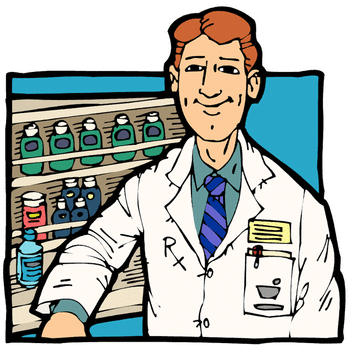
The Pharmaceutical Industry is one of the largest in the world. Globally, it generates sales of over $900 billion dollars annually, and, with people living longer, sales volumes are forecast to continue growing steadily for many years to come.
Without question, the Pharmaceutical Industry has benefitted mankind in ways never believed possible. Life-saving medications have allowed millions of people to enjoy happy, productive lives, despite being afflicted by any number of significant illnesses and injuries. It’s really not inappropriate to view many of these medications as “Wonder drugs.”
During the process of developing promising new drugs -- through discovery, pre-clinical trials, clinical trials on individuals, and FDA approval -- pharmaceutical companies seek to establish the precise effectiveness of each drug for treating a specific disease or injury, while also identifying other unexpected reactions in the body, known as “side effects.”
“Side effects.” Or, more technically speaking: Indications and Contraindications. The “do’s and do not’s.” The potential “downside” of your prescription. The “You gotta be shittin’ me” factor.
These are all rather common phrases for “side effects,” which, by the way, must be shared with all patients and prospective patients, whenever they are exposed to the medication. And how is this accomplished? By legally mandating that all products and promotional materials carry warnings: the labels on packaging, language in magazine ads, radio and television commercials, and virtually every conceivable medium used to promote the awareness of specific drugs for specific ailments. Overall, this barrage of information -- and please excuse the pun – comes across as “overkill.”
The ultimate in corporate C.Y.A.
Is it important to notify and warn a patient about the potential side effects of a drug? Well, of course, it is. It’s critically important. And that’s why we have physicians, nurses and pharmacists. People extensively trained to inform you of the potentially lethal aspects of getting better. But, please… Not, a one-page magazine ad accompanied by two pages of indecipherable small print. Not a 30-second TV commercial extended to one-minute so a fast-talking announcer can imply you’re an idiot to even consider taking the meds.
Really… These ominous warnings make you want to ask the pharmacist, “Before taking this remedy for prickly heat, should I make certain my affairs are in order? I mean, sure, I’m tired of this itching, but I don’t want to leave my wife financially unprepared.”
And, finally, there’s the medication which has received so much notoriety for its purpose and potential side effects: Viagra.
Be assured, these ED medications are among the most successful pharmaceutical products ever developed. Even when you consider sales volume. They are, however, dispensed with a small list of possible side effects. Relatively minor issues (and please keep in mind, we are talking about men here) such as:
All of which are quite easily correctable with aspirin, Benadryl and sunglasses.
And referring specifically to that last one…
If I were to take a Viagra and found myself, four hours later, still burdened by this particular side effect, then I would rise to my feet, stand proudly perpendicular to Mr. Wiggly and exclaim, “Well done, Old sport. Well done.”
How about that?
Without question, the Pharmaceutical Industry has benefitted mankind in ways never believed possible. Life-saving medications have allowed millions of people to enjoy happy, productive lives, despite being afflicted by any number of significant illnesses and injuries. It’s really not inappropriate to view many of these medications as “Wonder drugs.”
During the process of developing promising new drugs -- through discovery, pre-clinical trials, clinical trials on individuals, and FDA approval -- pharmaceutical companies seek to establish the precise effectiveness of each drug for treating a specific disease or injury, while also identifying other unexpected reactions in the body, known as “side effects.”
“Side effects.” Or, more technically speaking: Indications and Contraindications. The “do’s and do not’s.” The potential “downside” of your prescription. The “You gotta be shittin’ me” factor.
These are all rather common phrases for “side effects,” which, by the way, must be shared with all patients and prospective patients, whenever they are exposed to the medication. And how is this accomplished? By legally mandating that all products and promotional materials carry warnings: the labels on packaging, language in magazine ads, radio and television commercials, and virtually every conceivable medium used to promote the awareness of specific drugs for specific ailments. Overall, this barrage of information -- and please excuse the pun – comes across as “overkill.”
The ultimate in corporate C.Y.A.
Is it important to notify and warn a patient about the potential side effects of a drug? Well, of course, it is. It’s critically important. And that’s why we have physicians, nurses and pharmacists. People extensively trained to inform you of the potentially lethal aspects of getting better. But, please… Not, a one-page magazine ad accompanied by two pages of indecipherable small print. Not a 30-second TV commercial extended to one-minute so a fast-talking announcer can imply you’re an idiot to even consider taking the meds.
Really… These ominous warnings make you want to ask the pharmacist, “Before taking this remedy for prickly heat, should I make certain my affairs are in order? I mean, sure, I’m tired of this itching, but I don’t want to leave my wife financially unprepared.”
And, finally, there’s the medication which has received so much notoriety for its purpose and potential side effects: Viagra.
Be assured, these ED medications are among the most successful pharmaceutical products ever developed. Even when you consider sales volume. They are, however, dispensed with a small list of possible side effects. Relatively minor issues (and please keep in mind, we are talking about men here) such as:
- A sudden loss of vision in one or both eyes
- A sudden loss of hearing
- Headache
- Flushing
- Upset stomach
- Abnormal vision, such as changes in color vision (such as having a blue color tinge) and blurred vision
- Stuffy or runny nose
- Back pain
- Muscle pain
- Nausea
- Dizziness
- Rash
- For a chubby lasting more than 4 hours, get medical help right away
All of which are quite easily correctable with aspirin, Benadryl and sunglasses.
And referring specifically to that last one…
If I were to take a Viagra and found myself, four hours later, still burdened by this particular side effect, then I would rise to my feet, stand proudly perpendicular to Mr. Wiggly and exclaim, “Well done, Old sport. Well done.”
How about that?

